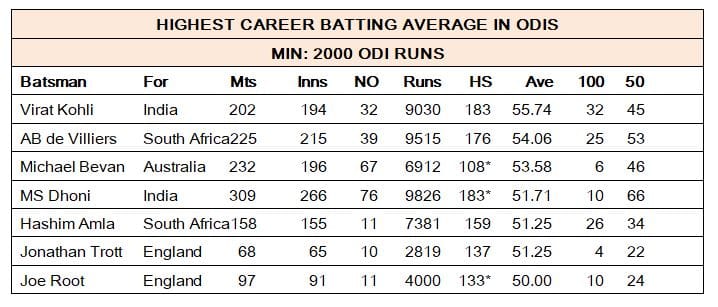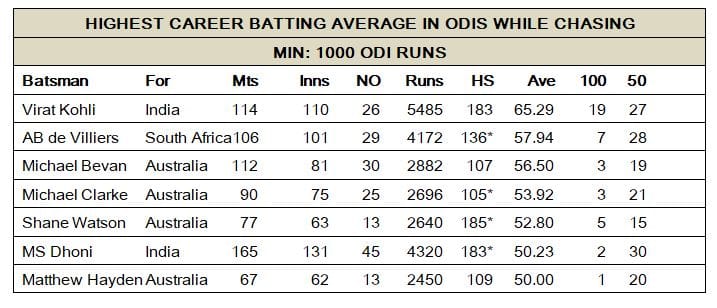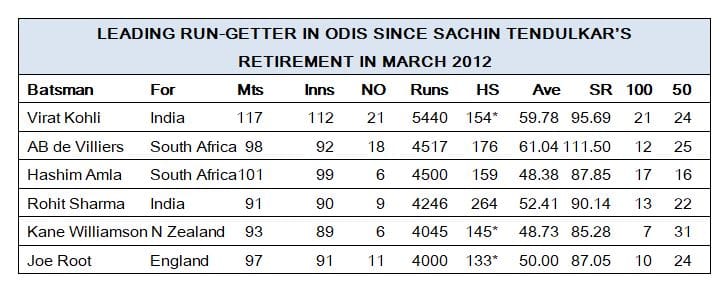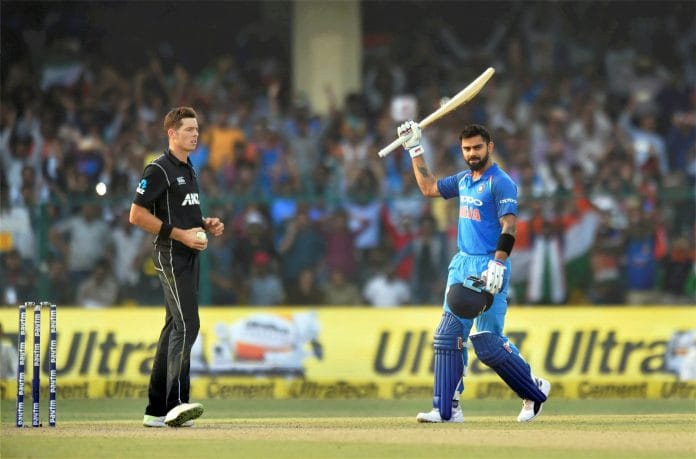In the latest ICC rankings for ODI batsmen, Virat Kohli has regained the No.1 spot in the world. However, he’s achieved something bigger too — his new career ratings points peak of 889 is higher than Sachin Tendulkar’s 887, the best ever for an Indian. On Tuesday, former England captain Michael Vaughan started the debate about Kohli being the greatest ODI batsman with a tweet.

With Virat Kohli surpassing Sachin Tendulkar’s ICC ratings record, is he now the greatest ODI batsman ever? TalkPoint brings sharp perspectives.
Kohli is already the world’s best ODI batsman. He has the opportunity to be India’s best ever in Tests too
 Shekhar Gupta
Shekhar Gupta
Chairman and Editor-in-Chief, ThePrint
The trouble with any cricket rankings, for teams as well as individuals, is there is no established formula, unlike, say, the ATP rankings in tennis. But that is also the romance of cricket rankings. While the ICC rankings are more structured than most, they don’t take into account conditions, which matter in cricket more than any other team game: the pitches, the amount of grass, the relative size of the ground and length of boundaries, even humidity, dew, sunshine, or cloud-cover. Home and away then acquires a very important meaning.
Nevertheless, on Virat Kohli, let’s get the easier questions out of the way. Certainly, he is the best ODI batsman now by some distance. A.B. de Villiers now seems off his peak. Other rivals Steve Smith, Joe Root, Kane Williamson, and our own Rohit Sharma, trail him overall. Second, and it is the contentious one, he is by a distance the best Indian ODI batsman ever. Apologies, Sachin Tendulkar fans — I am one too. But just his average, strike rate, and records in chasing and winning put Kohli above Sachin.
Now, is he the best ever? I am quite sure he is. He’s a 50+ average batsman over a long period with a strike-rate upwards of 91, and 19 hundreds in chases. All those who averaged close to him either had lower strike rates, or trailed him on chasing ability, and performance in relatively challenging match situations.
He is a pretty complete package with his fielding, captaincy, and ability at psychological warfare. He is still some distance from being the best Test batsman, though. His average is still below that final frontier of 50, in spite of a long home season recently. Sachin is by far India’s best no. 4 (in batting order) and Rahul Dravid, Sunil Gavaskar and Virender Sehwag all top Kohli in Tests. So, that is his next frontier. Get his average above 50 first, be consistent, and win a few games.
Kohli is India’s first ‘Australian’ batsman in approach and style: playing on the up, and using drives and pulls as his main scoring shots, domination of the bowler, nifty running and, indeed, mind-games. He has the opportunity to rise as the best Test batsman of his own era, and India’s for all times. The competition in the rest of the world is more formidable, beginning with Donald Bradman’s average of 99.94.
If the second half of Kohli’s career is as productive, the debate over ‘the greatest’ may become superfluous
 Ayaz Memon
Ayaz Memon
Cricket commentator
Virat Kohli’s batting in ODIs has had statisticians in a tizzy ever since he made his debut. In 2017 alone, he’s already made 1,460 runs, the highest-ever in a calendar year by any captain in the history of the format.
Irrepressible form has taken his career aggregate to 9,030 runs – in only 202 matches – in the recent series against New Zealand. Two centuries in the three matches swelled the tally to an astonishing 32, placing him behind only record holder Sachin Tendulkar, who has 49.
His current batting average (55.74) puts him above everybody else in ODIs – past and present – and his strike rate (91.73) is second only to A.B. de Villiers among contemporary cricketers.
Such mind boggling numbers have understandably fuelled debate whether Kohli is the greatest ODI batsman ever.
Statistics are pivotal in cricket and, as an index to a player’s competence, mostly reliable. But they don’t necessarily establish greatness comprehensively. Sir Donald Bradman is the sole exception. His Test average of 99.94 – just this one stat – bespeaks his virtuosity.
For the rest, issues like match situation, quality of pitch, opposing bowlers etc have to be factored in. A half-century on a torrid pitch would carry greater weightage than a century on a featherbed, though this will not be reflected in bald stats.
Vivian Richards, still widely regarded as perhaps the best ODI player, made only 11 centuries. Tendulkar, who vies with Richards for the top accolade, averages 44.83, much below Kohli.
Depending on the era and country one belongs to, the debate over ‘the greatest’ gets even more heated and expansive. Ponting, Hayden, Gilchrist, Lloyd, Greenidge, Gayle, Miandad, Inzamam, Kallis, Sehwag, Ganguly, de Villiers, Sangakkara, Jayasuriya and Amla are some names that feature prominently.
The amazing aspect about Kohli, however, is that he is already in this elite group, though only at the halfway point of his career. If the second half is about as productive as the first, the debate itself may become superfluous.
Kohli undoubtedly takes the lead when it comes to limited-overs cricket, but Sachin takes the overall pie due to his Test record
 Rajdeep Sardesai
Rajdeep Sardesai
Journalist and author of book ‘Democracy’s XI: The Great Indian Cricket Story’
In terms of pure statistics, Kohli definitely has an edge over Tendulkar in ODIs. While we cannot compare players of two different eras, say someone from the 1960s to a player half a century later, but we can definitely compare Kohli’s statistics with Tendulkar’s as their eras overlapped.
Tendulkar belonged to a generation which was brought up on the diet of Test cricket, when ODIs were not as popular or cherished as they are now. In fact, he first opened an ODI innings in 1994, six years after his debut. He then successfully tailored his Test game to one-day cricket. On the other hand, Kohli made an exceptional transition from one-day cricket to Tests.
Moving beyond plain statistics, we should also be wary of the fact that in the 1990s to mid-2000s, scores of 260-75 were considered humongous; today, we see teams notching up and chasing downs totals of more than 300 frequently. Additionally, the quality of fast bowlers that Tendulkar faced was far better than Kohli has in his career, which has further been complemented by the onslaught of Twenty20 cricket. The strike-rates of present-day batsmen tend to be higher because the pace and style of batting in T20 seeps into ODIs. So, we see batsmen scoring more runs and at a faster pace.
Kohli undoubtedly takes the lead when it comes to limited-overs cricket, because he has more centuries, more runs and a better average compared to Sachin at the same point in their respective careers. But overall, Sachin takes the pie due to his Test record, though Kohli has done enough to adapt his game to all the three formats of the game equally well.
The best time to judge the two players is when Kohli’s career ends.
Kohli stands on the shoulders of earlier giants and builds on their body of work
 Prem Panicker
Prem Panicker
Sports writer
There is a hunger for “narrative” results in recurring debates on whether a player is, or is not, the greatest of all time. Any such comparison is subjective, therefore captive to the biases and prejudices of the person making it. Equally, the here-and-now immediacy of a current player is always more compelling than the deeds from a dimly remembered past. To underline this, ask yourself: Who did you think was the greatest ODI player five years ago? Ten?
To ask if Virat Kohli is the greatest one-day player of all time is to ignore an essential point — excellence in sport is cumulative. Each generation builds on the deeds of those who have gone before. Past greats explored new cricketing landscapes. The ones who follow consolidate, and expand. Kohli stands on the shoulders of those earlier giants and builds on their body of work.
There is however a strong case that Kohli forces us to abandon earlier dogmas and to think of one-day batting differently.
To cite the most obvious example, a foundational dogma of one-day batting is innovation; and that it succeeds when it jettisons the grammar of Test batting. Kohli has inversed that thinking — his batting is organised along the best canons of Test cricket and he proves, repeatedly and captivatingly that straight-bat orthodoxies are not constraints; rather, they are enabling mechanisms that help him succeed to a previously unimaginable extent.
His counter-intuitive thinking and consistently extraordinary performance disrupts received wisdom and lights up new pathways to success — which is a far more valuable contribution than even his 9030 ODI runs, his 32 centuries, his 45 half centuries, and his average of 55.7 at a 91.7 strike rate.
Greatness goes where no one has gone before and in that sense, Kohli is a true great. The GOAT? Why not wait until the end of his time before we slot him into his rightful place in the pantheon?
Dhoni, not Kohli, is India’s best ever ODI batsman; Viv Richards was the world’s greatest
 Sanjay Dixit
Sanjay Dixit
Former president, Rajasthan Cricket Association
Michael Vaughan has overshot the runway here. Virat Kohli is definitely the best ODI batsman today, but I do not rate him the best ever. I did not even rate A.B. de Villiers the best ever when he was at his best, and he enjoyed a much higher lifetime ICC rating (902) than Kohli (889).
Why don’t I rate de Villiers? He never won the World Cup. His record is modest where it counts the most.
Ditto for Michael Bevan. He has a fantastic record and career average (53.58), but his record is modest in the two World Cups that he played in and Australia won (1999 and 2003).
Sachin Tendulkar was one of the best, but even he did not win a World Cup off his bat, even though he has the highest number of runs in the World Cups. I do rate Virat Kohli higher than Sachin, though. Virat enjoys a higher lifetime ranking score than Sachin (887), but there are as many as 13 players with a higher score.
You get to be the best ever when you show your mettle in difficult situations.
On this criterion, I place M.S. Dhoni as the best-ever Indian ODI batsman. It is not easy to maintain a 50-plus average coming lower down, and being a part of so many winning chases. Besides, Dhoni is the only Indian batsman to have won India a World Cup final off his bat.
As far as the title of the world’s best ever is concerned, the great Vivian Richards (935) has no peer. Till Virat Kohli plays an innings like the 189 not out Viv played against England at Old Trafford in 1984, taking West Indies from 102-7 to 272-9, Virat cannot even come close.
Besides, Virat has to win a World Cup off his bat.
Computers can’t decide greatness in cricket, but Kohli is on track to surpass Tendulkar
 Shreyas Sharma
Shreyas Sharma
Assistant editor, ThePrint
Let the record show – I am an unabashed Tendulkar worshipper. For me, he was cricket. To every point you can conjure up as a negative against him, I will have a counter-point ready. And when all else fails, I’ll take the argument beyond the physical and the statistical. Tendulkar was not a batsman to be watched; he was an emotion to be experienced.
Then came this upstart called Virat Kohli. He was technically sound, could score bucket-loads of runs, and oozed confidence instead of sweat. He also had an attitude that many of us who had grown up idolising the gentlemen of the game found toxic and intolerable.
But there exists a difference between watching cricket on TV and covering the practice sessions at the grounds. You don’t see the cricketer at his best, you see him at his most vulnerable — the day after a bad dismissal, for example.
That’s what made my bias against Kohli fall by the wayside — I have not seen an Indian batsman work harder at the nets, with the sole exception of Rahul Dravid. And his temperament? Utterly infallible!
That Hobart hundred in 2012, when India chased down 321 in 36.4 overs to reach the final was Kohli’s ‘Desert Storm’ moment. That is when the baton was passed from the Master to his successor as India’s best batsman.
We don’t need the ICC rankings to tell us that he is getting better. But now, he’s gone and trumped Tendulkar’s record for most ODI ratings points accumulated by an Indian batsman in history.
But cricket is much more than statistics. A ratings system as complex as the ICC rankings takes subjectivity and romanticism, drowns them in a pool of binary digits, and throws them out of the window.
The ICC computer can’t decide if Kohli is greater than Tendulkar. Rather, it shouldn’t. But given his track record, his work ethic, his hunger, and his dedication to the game, one day I might be grudgingly able to accept that Kohli is better than Tendulkar.
But let him get there first. There’s a ways to go.
Kohli has had superior teammates to Tendulkar, therefore the pressure has been off
 Talha Ashraf
Talha Ashraf
Journalist, ThePrint
The greatness debate is as old as the game, especially in a cricket-frenzied culture. Indians have tended to idolise their batting icons, and no one matched Sachin Tendulkar’s following, in terms of both numbers and passion, until the baton was passed on to, or rather, earned by Virat Kohli.
The similarities do not just end with their unquenchable thirst for runs and records; they also extend to their personal lives – their on-field grit in the face of their fathers’ demises is a case in point.
But to say Kohli has surpassed Tendulkar in his greatness is a naïve assessment of the game. The cliched argument is “we cannot compare two different generations”, but why shouldn’t we? In terms of runs scored, average, and conversion rate, Kohli surpasses many former and current legends. He has leaped past his contemporaries Joe Root, Kane Williamson, and even Rohit Sharma by a distance.
Is this enough to be called an all-time great? Cricket is a team game; therefore, we have to set our comparison in the environment and the team a player plied his trade in.
Some fans have a grouse against Sachin that he did not finish off chases, and got out after scoring breathtaking centuries. He lacked the cushion Kohli has had, in the form of his top-order, middle-order, and lower-order colleagues. The MSD factor also alters any metric of comparison, as Dhoni is arguably the best finisher India has had till date, and has helped Kohli play in a team that’s far superior to most of the eras Tendulkar’s career spanned. Kohli, thus, has had far less pressure on him, and has been able to play more freely compared to the Master Blaster.
In terms of collective impact, Kohli has given a new dimension to the game in India, making physical fitness and in-your-face aggression a norm. While Tendulkar taught Indians that we could hit sixes off bouncers, Kohli has moulded India the Australian way.
India’s rapid strides to the No.1 position are largely due to the emergence of Kohli, the new force in Indian cricket
 Mohandas Menon
Mohandas Menon
Cricket statistician
Mostly known as a well-groomed, non-controversial, typical English cricketer, Michael Vaughan — post retirement as a media personality — has many a time ruffled feathers. His run-ins with Indian fans on Twitter are legendary.
Immediately after Virat Kohli’s 32nd ODI hundred, gushing over the casual ease with which he scored the runs, Vaughan ran a Twitter poll asking followers if Virat Kohli was the greatest ever 50-over player.
India’s rapid strides to the No.1 position are largely due to the emergence of the new force in Indian cricket, Kohli. Though he occasionally reveals qualities of that brash young man the world sat up and took notice of back in 2008 when his side lifted the U-19 World Cup in Malaysia, Kohli in 2017 is a leader, literally and figuratively.
Becoming the No.1 batsman in two of the three forms of the game is no mean achievement. With over 10,000 runs in the limited-overs formats and some eight years still left in his career, who knows what heights he can achieve?
His record while chasing is second to none, with 19 of his 32 centuries scored batting second. Seventeen of his 19 centuries have come in winning causes, with Sachin Tendukar coming second behind Kohli with 14 centuries out of 17.



Equating statistical superiority with greatness is a rather simplistic assessment of talent
 Abhishek Krishnan
Abhishek Krishnan
Business Analyst, ThePrint
Virat Kohli is a modern day re-incarnation of Sachin Tendulkar. Equating statistical superiority with greatness is a rather simplistic assessment of their talents.
Looking beyond records, both these men have managed to capture the imagination of this nation and the cricketing fraternity in a way that is distinctively unparalleled.
As the anchor of an up-and-coming yet uncertain batting line-up in the 1990s and early 2000s, Tendulkar came to symbolise a sense of hope and a new realm of possibilities for the Indian fan. Off the field, his brand persona was an extension of the new-found confidence of a liberalised, privatised, and globalised India. He was first Indian cricketer to become the source of such frenzy.
Kohli, on the other hand, is bearing the fruits of the Master’s labour, while aggressively pushing the boundaries of modern cricketing genius. His game is a classy display of unabashed self-confidence, borne out of a willingness to challenge the status quo and deliver on the big stage. He has this almost aspirational quality of a single-minded focus towards actively achieving greatness.
Additionally, it would be criminal to overlook the on- and off-field pressure these two men operated under. Tendulkar was largely faced with the pressure of expectations from the Indian fans. As the only source of stability in that batting line-up, his ability to single-handedly take the team over the finish line was remarkable. Although equally indispensable, Kohli on the other hand seems to be fabulously coping with the pressure arising out of an unforgiving cricket calendar.
Having played half the number of matches, if Kohli decides to retire today, his name will be taken in the same breath as Tendulkar. He is definitely on his way to share the tag of the undisputed legend, if not own it.
The restrained aggression and a rock-solid technique of the Master has now transitioned into the unparalleled physical and mental strength of the King. The yesteryear genius of Sachin Tendulkar has found its rightful heir in Virat Kohli.
Compiled by Talha Ashraf and Shreyas Sharma.







Unless proved by winning tournaments off his bat or ball consistently no player can be called the greatest batsman or bowler. Greatest batsman has little value outside statistics unless embellished with what the team or country wants- the trophy. Kapil Dev scores in this respect with Steve Waugh and Dhoni. Sanjay Dixit gets it right when he puts Dhoni ahead of others by hitting winning post by scoring at crucial times. Had Kapil not scored against Zimbabwe when it mattered most and won the match for us from 17 for 5, there would have been no world cup for us in 1983. Captaincy itself is measured how good you are when chips are down and able to make the team believe they can still win. Steve Waugh, Dhoni and Kapil come in that category. Kohli is well equipped to join the group but has a long way to go. Somebody can be called the Greatest, if he beats Bradman’s record of a century off 22 balls in any form of cricket!
E.R. Ramachandran
Only conceited Indians can make this into a debate between kohli and Tendulkar, completely forgetting that more than 1 country plays cricket. The best ODI batsman is Ricky Ponting. Ofcourse silly Indians will remain content with a Mumbai Vs Delhi debate and lose sight of the number of World Cup titles Aus have won. Terribly myopic and self-aggrandizing. Indians could never look beyond Tendulkar, and now they ll deify Kohli – who failed both at WC and Champs Trophy
Ricky Ponting is a wonderful batsman for sure and your opinion on him being the GOAT is not too farfetched. Though I dont think the whole number of titles thing is applicable in your defense of him being the best batsman , he did contribute his share but what about that team!!? , he was playing in probably the Greatest ODI team of all time while sachin had to play in a good team, still mediocre at best given how other teams were performing. Moreover its his consistency and adaptability as he aged which puts him right at the top and this is not owing to the fact that he was termed the GOAT by “myopic” Indians. The man deserves better. Have you seen the rest of the Aussie greats play before considering Ponting the best? Besides if you wanna put stats count like titles into the debate, why dont you check on the batting stats. Oh right maybe you are one of those myopic Indians.